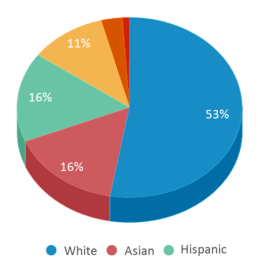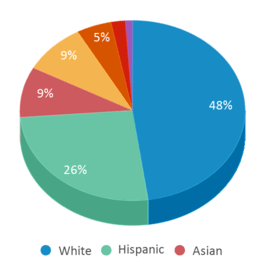Serving 1,766 students in grades 9-12, Bothell High School ranks in the top 10% of all schools in Washington for overall test scores (math proficiency is top 30%, and reading proficiency is top 30%).
The percentage of students achieving proficiency in math is 55% (which is higher than the Washington state average of 40%). The percentage of students achieving proficiency in reading/language arts is 87% (which is higher than the Washington state average of 53%).
The student:teacher ratio of 20:1 is higher than the Washington state level of 16:1.
Minority enrollment is 47% of the student body (majority Hispanic and Asian), which is lower than the Washington state average of 52% (majority Hispanic).
Quick Stats (2025)
- Grades: 9-12
- Enrollment: 1,766 students
- Student:Teacher Ratio: 20:1
- Minority Enrollment: 47%
- Graduation Rate: 96% (Top 5% in WA)
- Overall Testing Rank: Top 10%
- Math Proficiency: 55% (Top 30%)
- Reading Proficiency: 87% (Top 5%)
- Science Proficiency: 47% (Btm 50%)
- Source: National Center for Education Statistics (NCES), WA Dept. of Education
Top Rankings
Bothell High School ranks among the top 20% of public schools in Washington for:
Category
Attribute
Overall Rank
Reading/Language Arts Proficiency
Graduation Rate
School Overview
Bothell High School's student population of 1,766 students has grown by 21% over five school years.
The teacher population of 89 teachers has grown by 36% over five school years.
Grades Offered
Grades 9-12
(offers virtual instruction)
(offers virtual instruction)
Total Students
1,766 students

Gender %

Total Classroom Teachers
89 teachers

Students by Grade

School Rankings
Bothell High School ranks within the top 10% of all 2,113 schools in Washington (based off of combined math and reading proficiency testing data).
The diversity score of Bothell High School is 0.66, which is less than the diversity score at state average of 0.69. The school's diversity has stayed relatively flat over five school years.
Overall Testing Rank
#199 out of 2113 schools
(Top 10%)
(Top 10%)

Math Test Scores (% Proficient)
55%
40%

Reading/Language Arts Test Scores (% Proficient)
87%
53%

Science Test Scores (% Proficient)
47%
49%
Student : Teacher Ratio
20:1
16:1

American Indian
n/a
1%

Asian
16%
9%

Hispanic
16%
26%

Black
3%
5%

White
53%
48%

Hawaiian
1%
2%

Two or more races
11%
9%

All Ethnic Groups



Graduation Rate
96%
84%

Eligible for Free Lunch
25%
49%

Eligible for Reduced Lunch
7%
8%

School Statewide Testing
School District Name
Source: National Center for Education Statistics (NCES), WA Dept. of Education
Profile last updated: 02/09/2025
Frequently Asked Questions
What is Bothell High School's ranking?
Bothell High School is ranked #199 out of 2,113 schools, which ranks it among the top 10% of public schools in Washington.
What schools are Bothell High School often compared to?
Bothell High Schoolis often viewed alongside schools like Inglemoor High School by visitors of our site.
What percent of students have achieved state testing proficiency in math and reading?
55% of students have achieved math proficiency (compared to the 40% WA state average), while 87% of students have achieved reading proficiency (compared to the 53% WA state average).
What is the graduation rate of Bothell High School?
The graduation rate of Bothell High School is 96%, which is higher than the Washington state average of 84%.
How many students attend Bothell High School?
1,766 students attend Bothell High School.
What is the racial composition of the student body?
53% of Bothell High School students are White, 16% of students are Asian, 16% of students are Hispanic, 11% of students are Two or more races, 3% of students are Black, and 1% of students are Hawaiian.
What is the student:teacher ratio of Bothell High School?
Bothell High School has a student ration of 20:1, which is higher than the Washington state average of 16:1.
What grades does Bothell High School offer ?
Bothell High School offers enrollment in grades 9-12 (offers virtual instruction).
What school district is Bothell High School part of?
Bothell High School is part of Northshore School District.
School Reviews
5 2/25/2011
I went to Bothell High School and it's a pretty decent school as far as secondary education goes. Football and drama are probably the biggest and the best departments at BHS, though I did not participate in either of them. Education quality is solid, not the best, but pretty good. I'd like to shout out that there are some fabulous teachers here, especially in the math, english, and social studies departments, but there are very incompetent ones as well. My one biggest complaint about BHS is the faculty; they are just awful. Many of the women who work in the offices are just straight up rude. The counselors are also very unhelpful and don't really have to listen to what you have to say and only say what THEY think is best for you. It's quite annoying actually when you need guidance for the path you plan to pursue and then have your counselor look down upon you and try to sway you into a better direction. Anyway, I think BHS is a decent school but Inglemoor is better in terms of academics.
Review Bothell High School. Reviews should be a few sentences in length. Please include any comments on:
- Quality of academic programs, teachers, and facilities
- Availability of music, art, sports and other extracurricular activities
Recent Articles

What Is A Charter School?
Explore the world of charter schools in this comprehensive guide. Learn about their history, how they operate, and the pros and cons of this educational innovation. Discover key facts about charter schools, including admission policies, demographics, and funding, as well as what to look for when considering a charter school for your child.

10 Reasons Why High School Sports Benefit Students
Discover the 10 compelling reasons why high school sports are beneficial for students. This comprehensive article explores how athletics enhance academic performance, foster personal growth, and develop crucial life skills. From improved fitness and time management to leadership development and community representation, learn why participating in high school sports can be a game-changer for students' overall success and well-being.

February 05, 2025
Understanding the U.S. Department of Education: Structure, Impact, and EvolutionWe explore how the Department of Education shapes American education, from its cabinet-level leadership to its impact on millions of students, written for general audiences seeking clarity on this vital institution.









